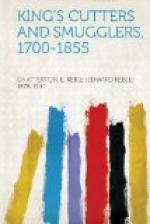The second incident was of a slightly more complicated nature, and occurred on October 20, 1805, about midnight. The two men implicated were a Captain Riches, who was in command of the Revenue cutter Hunter, and his mate Oliver.
This vessel, whose station was Great Yarmouth, was on the night mentioned cruising in the North Sea. Presently the cutter sighted what turned out to be the Danish merchant ship, The Three Sisters, Fredric Carlssens master, from Copenhagen bound for St. Thomas’s and St. Croix. Oliver got into the cutter’s boat and boarded the Dane. He also demanded from the latter and took from him four cases of foreign Geneva, which was part of The Three Sisters’ cargo. In spite of Carlssen’s opposition, Oliver put these into his boat and rowed off with them to the Hunter. Riches was obviously party to this transaction, and was accused “that contrary to the solemn oath taken at his admission into office, he did not only neglect to report to the Collector and Controller of Yarmouth or to the Board the misconduct of his Mate, in unlawfully taking from the said ship the four cases of Geneva in question, but did take out of them for his own use, and by so doing did connive at and sanction the aforesaid unproper conduct of his Mate.” It was also brought against Riches that he had not entered any account of this incident into his ship’s journal, or made any record of the mate boarding the Dane.
In the end Riches was adjudged by the Board guilty of not giving information regarding his mate’s conduct and of receiving one case of Geneva for his own use, but he was acquitted of connivance for want of evidence. He was found guilty also of not having entered the incident in his journal. Oliver was acquitted of having boarded the Danish ship for want of proof, but found guilty of having failed to keep a complete journal of his proceedings. But a further charge was made that Riches caused a case of foreign spirits, which had been taken out of the Danish ship, to be brought ashore from the cutter and taken to his home at Yarmouth without paying the duty thereon. Oliver was also accused of a similar crime with regard to two cases. Riches was acquitted for want of proof of having caused the gin to be taken to his house, but found guilty of having received it, knowing the duty had not been paid. Oliver was also found guilty, and both were accordingly dismissed.
And there was the case of a man named Thomas Rouse, who was accused of having been privy to the landing of a number of large casks of spirits and other goods from a brig then lying off the Watch-house at Folkestone. This was on the night of May 20 and the early hours of May 21, 1806. He was further accused of being either in collusion with the smugglers in that transaction or criminally negligent in not preventing the same. It was still further brought against him that he had not stopped and detained the master of the brig after




